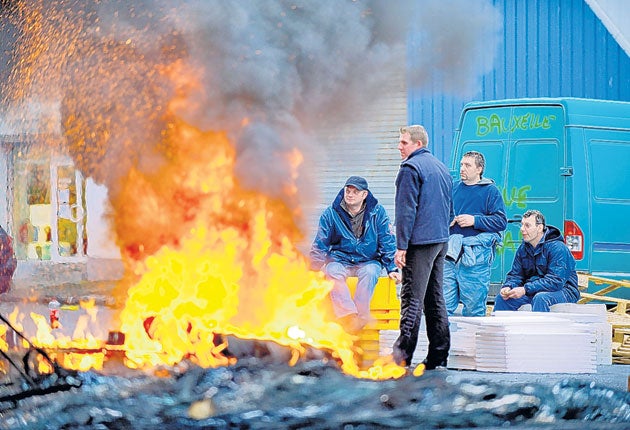French ports blockade may go inland
Fishermen split over pay-off, but Channel Tunnel is a likely target for further protests

Your support helps us to tell the story
From reproductive rights to climate change to Big Tech, The Independent is on the ground when the story is developing. Whether it's investigating the financials of Elon Musk's pro-Trump PAC or producing our latest documentary, 'The A Word', which shines a light on the American women fighting for reproductive rights, we know how important it is to parse out the facts from the messaging.
At such a critical moment in US history, we need reporters on the ground. Your donation allows us to keep sending journalists to speak to both sides of the story.
The Independent is trusted by Americans across the entire political spectrum. And unlike many other quality news outlets, we choose not to lock Americans out of our reporting and analysis with paywalls. We believe quality journalism should be available to everyone, paid for by those who can afford it.
Your support makes all the difference.French fishermen lifted their blockade of the Channel ports yesterday but warned that they might turn to other protests "on land", including barring the road access to the Channel Tunnel.
Car and truck ferries to and from Calais, Boulogne and Dunkirk, disrupted for two days, were operating normally by yesterday afternoon. The build-up of cars and trucks on both sides of the Channel rapidly diminished during the day but the dispute may not be over.
Fishermen from northern French ports appeared to be split last night. Some were reluctantly prepared to accept a cash pay-off from Paris. Others were determined to continue their demands for higher quotas, or catch limits, for cod and sole.
They warned that they intended to move their protests on-shore, which, in previous years, has involved attempts to barricade access to the Channel Tunnel. Bruno Dachicourt, of the trawlermen's section of the CFTC union federation, said: "The (blockading) boats are moving because we need everyone on land now... We are going to change the nature of our protests."
Ferry companies welcomed the lifting of the sea blockade but complained that fishermen's protests were becoming almost an annual event in northern France. They demanded that the French government should take a harder line.
Chris Laming, a spokesman for P&O Ferries, said: "France has a legal obligation under the EU treaty to keep that border open for the free movement of goods and people. They simply don't live up to their responsibilities."
The signs of a softening of the protests – or a split in the fishermen's ranks – followed an offer by the French agriculture and fisheries minister, Michel Barnier, of a €4m (£3.5m) subsidy to be divided between boats which have used up their quotas. He also promised to start talks with other EU nations on quota "swaps" to allow French boats to catch more sole.
The ferry companies also took legal action. An injunction against the blockades granted by a court in Boulogne-sur-Mer on Wednesday could have cost the fishermen's unions thousands of euros for each hour the ports were shut.
The protests have involved small, family-run boats from the Pas de Calais. The boat owners complain that, despite a 25 per cent increase in the EU cod catch in 2008 and a 30 per cent increase in 2009, they have been left with inadequate quotas. Many trawlers had already exhausted their permitted catches of cod and sole for the whole of this year by early April.
The fishermen's leaders complain that too much of the French share of the EU catch has gone to bigger boats and fishing companies in other French ports. The government says that it has followed the EU and scientific advice on the amount of fish available.
After a stormy mass meeting of fishermen in Boulogne yesterday, some appeared ready to give up their action. Others insisted the protests must go on.
Pascal Wacogne, who employs six men on his trawler, L'Arc-en-ciel, said his turnover had fallen by 25 per cent in 2008 and by 40 per cent in the first three months of this year. "We have to continue the protests. We can't go on as we are," he said. "I lose as much money if my boat goes to sea as if it stays tied up in harbour."
Judith Blatch, 47, a holidaymaker from Sudbury in Suffolk, said: "It's not good for British tourists anyway because of the rate of the Euro. With the fishermen blockading the ports it does put you off France."
Join our commenting forum
Join thought-provoking conversations, follow other Independent readers and see their replies
Comments